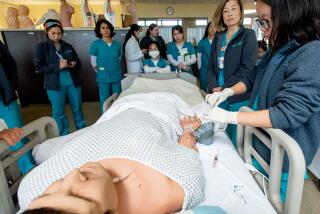Cal State Group Urges Reform of Teacher Training
Citing increased public concern over the quality of new teachers, seven California State University presidents and other education leaders on Tuesday urged the overhaul of teacher training programs throughout the state college system, including setting stringent graduation requirements for every prospective teacher.
The report, which Cal State trustees are expected to endorse today, also called for bolstering the education of prospective teachers during their undergraduate years--including the possibility of reinstating education as a major. In addition, it recommended that all Cal State faculty be evaluated in part on their participation in teacher training.
Once the trustees embrace the report, it will be up to each campus to devise ways to implement it.
“Teacher education is a front-burner issue right now in the CSU [system],” said Robert C. Maxson, president of the Long Beach campus and chairman of the presidents group on teacher training. “We have a perfect window of opportunity . . . to revolutionize teacher education.”
Criticism of schools of education has mounted in recent years, especially in California, where poor test scores have focused more attention on the quality of the teaching corps.
The state’s dismal ranking in federal assessments of students’ math and reading ability and the ongoing drive to reduce class sizes in kindergarten through third grades have lent urgency to Cal State’s drive to redesign teacher preparation programs.
Faced with growing school enrollments and teacher retirements, California will need as many as 300,000 new teachers over the next decade, the Cal State report said.
The system is the state’s primary source of teachers, churning out nearly 11,000, or 57%, of last year’s newly credentialed elementary and secondary instructors.
Even though most Cal State campuses intensified their training efforts last year, critics say the state still relies too heavily on so-called emergency permit instructors. More than 12,000 of the 250,000 teachers now in public school classrooms have not completed the course work necessary for a full credential. The problem is severe in urban districts, such as Los Angeles Unified, which employs more than 40% of the state’s emergency teachers.
*
The Cal State presidents group noted that increasing the flow of well-qualified teachers is a main objective of its recommendations to restructure the system’s training programs.
Maxson noted that the state budget this year provides about $5 million to Cal State to augment teacher preparation, mainly for hiring more faculty to train teachers.
The next Cal State chancellor, Charles B. Reed, who succeeds Barry Munitz early next year, has said that improving teacher training will be one of his major goals. Munitz already has made it a top priority throughout the system. He said Tuesday that Cal State, like most of the nation’s colleges and universities, has been guilty of a “fundamental hypocrisy,” giving lip service to the need to collaborate in school reform but failing to take concrete steps to further such efforts.
On Tuesday, the presidents group urged that teacher preparation become a “university-wide” responsibility--not just the job of the schools of education, which usually have the smallest budgets and lowest stature.
The group stopped short of recommending that the colleges reinstate education as an undergraduate major--abandoned years ago because critics said it had become too watered down and attracted the least-qualified students. But Maxson and others predicted that the issue would be brought to the fore in the coming months, as a growing number of education experts call for beefing up the training of teachers when they are undergraduates.
That enhanced training could mean allowing students to major or minor in education. Or it could mean strengthening liberal studies--the chief major chosen by Cal State’s teacher candidates--and incorporating it into the schools of education.
Currently, prospective teachers cannot major in education but enter a one-year teacher preparation program after earning a bachelor’s degree in another field.
Another key recommendation was to establish “exit standards” for students completing teacher training programs. This could mean a requirement that prospective teachers pass a rigorous subject-matter examination, for example, or prepare a portfolio demonstrating mastery of professional standards and knowledge.
*
The presidents also called for setting up a rewards system for Cal State administrators and faculty that recognizes efforts to help prepare teachers.
The report echoes the calls made by a statewide panel charged with revising the state’s system of preparing and credentialing teachers. These and other efforts are sending a loud message to the state’s teacher educators that business as usual will no longer do, said Carolyn Ellner, chairwoman of the California Commission on Teacher Credentialing and education dean at Cal State Northridge.
“We have to produce. If we don’t produce we’re in big trouble,” Ellner said. “Now we have to put our money where our mouth is.”
More to Read
Sign up for Essential California
The most important California stories and recommendations in your inbox every morning.
You may occasionally receive promotional content from the Los Angeles Times.










